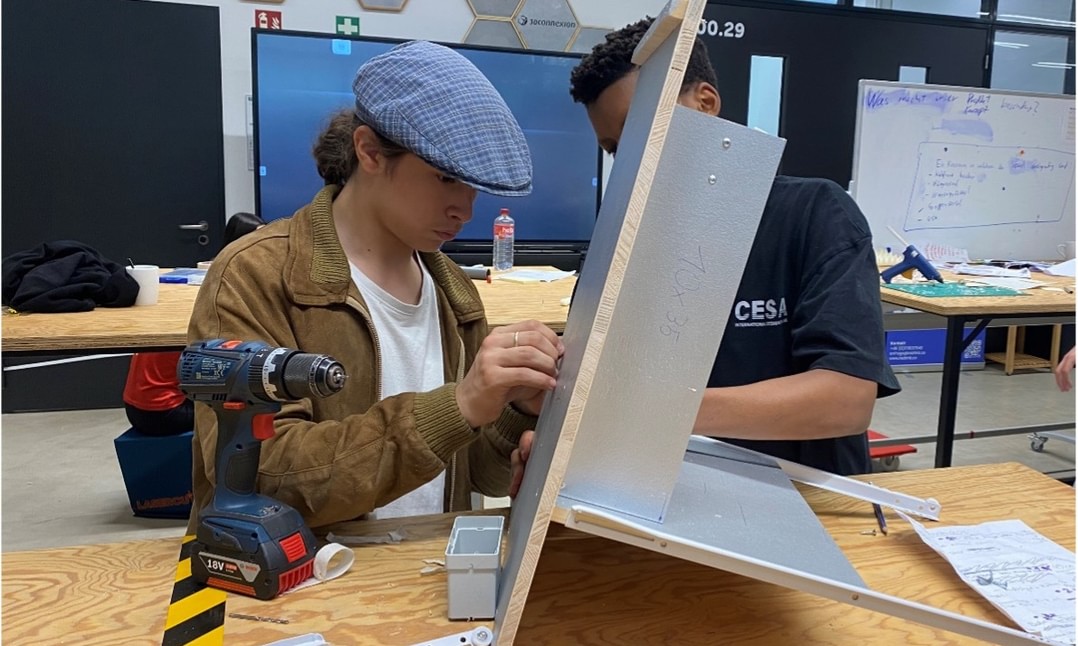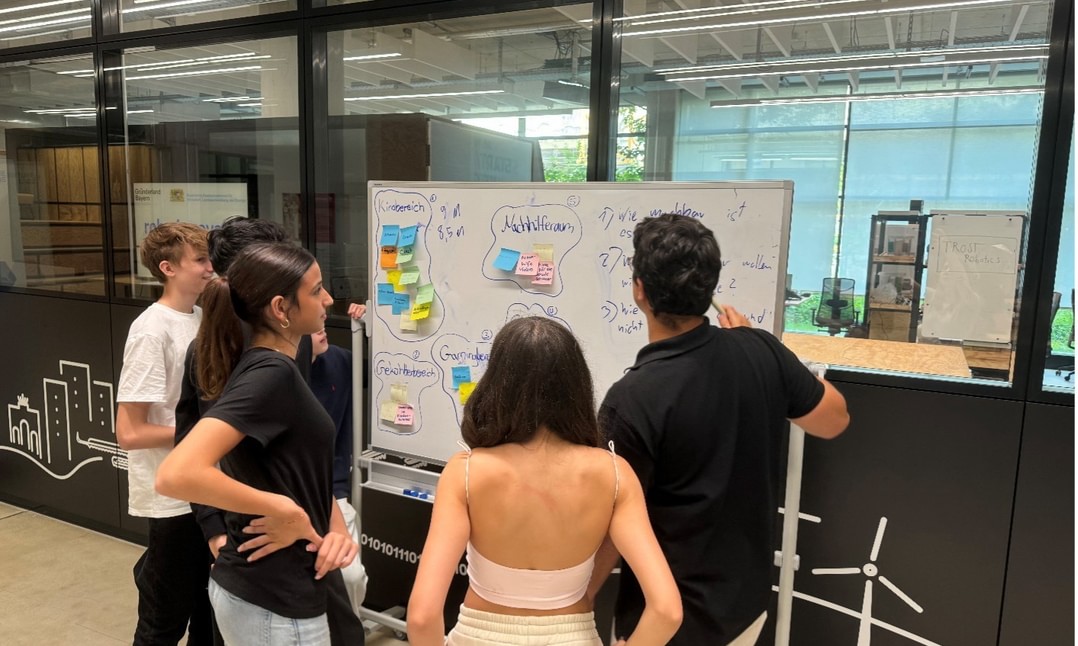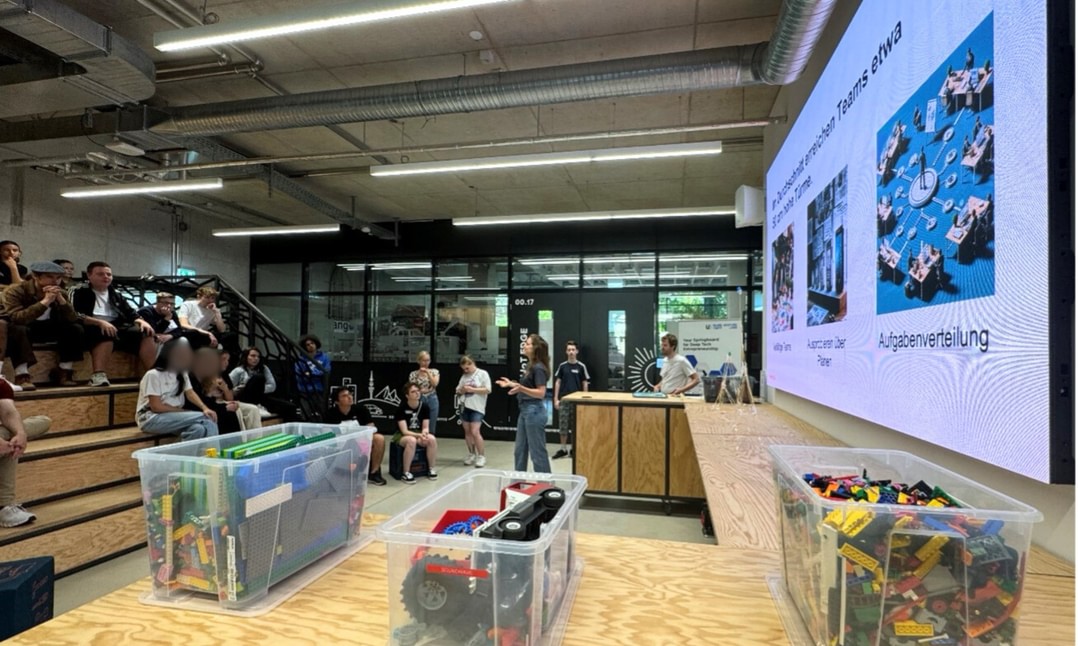From the nine-story city library in Stuttgart to the Bibliotheca Alexandrina in the Egyptian port city: libraries have always been more than just places of history and knowledge. They open up spaces for encounters, exchange, discussion and education. They promote new forms of social participation. And their architecture often has an impact on the cityscape. How do libraries need to adapt in the future in order to remain attractive to young people? What will the city library of the future look like?
The Munich City Library, the Department of Labor and Economic Development of the City of Munich, Mintech Engineering and the MakerSpace by UnternehmerTUM have developed an innovative workshop concept to find answers to these questions together with 20 students from Munich - and to develop the first prototypes in the Munich Urban Colab.
From craft glue to 3D printers: students develop new solutions
At the Munich Urban Colab - located in Munich's creative quarter - established companies, start-ups, science, business and the city administration have been working on solutions to urban challenges since 2021. How do we secure urban energy with innovations? What do we do about the housing shortage? How can successful urban planning and architecture have a significant impact on our health? Munich's citizens can and should actively participate in these topics. Bringing the residents of the city into the Munich Urban Colab and encouraging their contributions to innovative solutions is a central goal of the City of Munich. In July 2024, it was a school class from the Au-Haidhausen district that was able to contribute its ideas for the city of the future.

In 2023, a Future Week took place under the direction of the Munich City Library with the 8th grade of a secondary school, in which the students were given the opportunity to work on the topic “Library of the Future”. Thanks to the financial and personnel support of the Munich City Lab team from the Department of Labor and Economic Development, the same school class was once again invited to take part in a project week in the high-tech prototype workshop MakerSpace in the Munich Urban Colab. This time in an advanced version: instead of implementing creative ideas with craft glue and scissors, they now used laser cutters and 3D printers to bring their visions to life.

With the support of Mintech Engineering, the students immersed themselves in the world of design thinking. Thinking creatively, generating ideas and solving problems in innovative ways: The groups first developed ideas on paper, discussed their questions with the representatives from the Munich City Library and implemented functioning physical prototypes in the 1,200 square meter workshop within just one week. From a multifunctional couch to a silent basketball court: solutions were developed to make the city library more attractive and to create a meeting place that young people will continue to visit in their free time in the future. In the categories Think (best idea), Pitch (best presentation including video), Make (best prototype) and Impact (greatest impact), the prototypes were honored by a jury in the Motorama of the city library.

The results of the hackathon are extremely valuable for the Munich City Library. After all, Munich is home to more than 270,000 children and young people (data: December 31, 2024), many of whom are users of the city libraries. Knowing their wishes and ideas is crucial for the design of future services. What will happen with their ideas? The prototypes were exhibited to the general public in the city library for a few days after the final event. The idea of the silent basketball court was very well received, especially from a sports and health perspective and will now be pursued and implemented.
The specialists of tomorrow: Why the hackathon was much more than just a project week
As part of the hackathon, students not only develop their skills in the areas of teamwork, communication, creativity, self-organization and presentation, they also have access to tools, machines and new technologies in the MakerSpace. Here they were able to gain their first knowledge and skills in typical STEM professions. After all, many people want to get young people excited about science, technology, engineering and mathematics. But getting them to actually do it often remains a mystery. For this reason, the Klaus Tschira Foundation was also financially involved in the hackathon, which tackles precisely this problem together with the MakerSpace. Over the course of 2024, the foundation plans to set up a STEM youth program that will offer around 200 young people the opportunity to gain practical qualifications. “The idea of sustainable networking is extremely important to us,” says Alev Dreger, Education Funding Officer at the Klaus Tschira Foundation. “As an extracurricular educational venue, the MakerSpace could provide an important impetus to counteract the shortage of young talent at an early and fundamental stage.”
Tamy Saurer, Department of Labor and Economic Development of the City of Munich, adds: “We want to continue supporting school classes to work in a creative and innovative environment in the MakerSpace at the Munich Urban Colab and to spend a week working on practical projects outside of the regular school day.”


